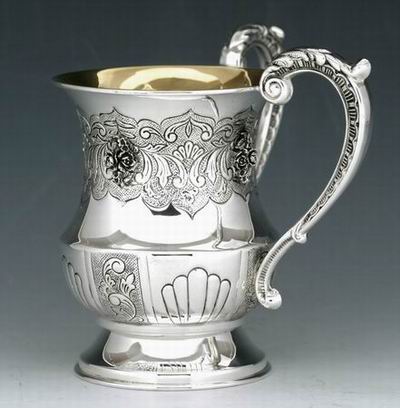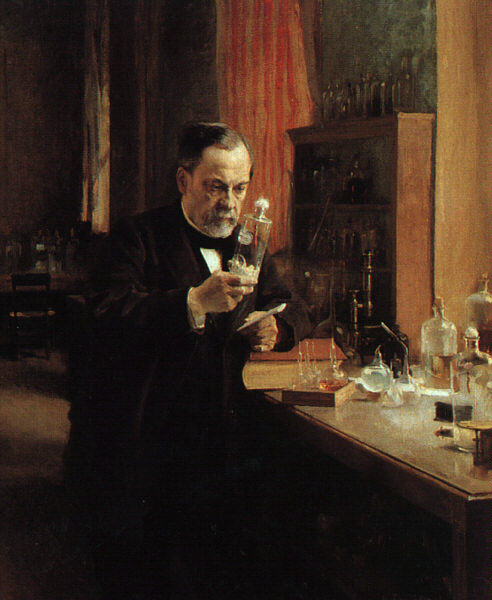A silver cup for netilat yadayim, the Jewish ritual washing of hands
Readings (Jerusalem Bible: Australia, England & Wales, India [optional], Ireland, New Zealand, Pakistan, Scotland, South Africa)
Gospel Mark 7:1-8, 14-15, 21-23 (Revised Standard Version – Catholic Edition)
Now when the Pharisees gathered together to him, with some of the scribes, who had come from Jerusalem, they saw that some of his disciples ate with hands defiled, that is, unwashed. (For the Pharisees, and all the Jews, do not eat unless they wash their hands, observing the tradition of the elders; and when they come from the market place, they do not eat unless they purify themselves; and there are many other traditions which they observe, the washing of cups and pots and vessels of bronze.) And the Pharisees and the scribes asked him, "Why do your disciples not live according to the tradition of the elders, but eat with hands defiled?"
And he said to them, "Well did Isaiah
prophesy of you hypocrites, as it is written, 'This people honors me with their lips, but their heart is far from me;
in vain do they worship me, teaching as doctrines the precepts of men.'
“You leave the commandment of God, and hold fast
the tradition of men."
And he called the people to him again, and said
to them, "Hear me, all of you, and understand: there is nothing outside a
man which by going into him can defile him; but the things which come out of a
man are what defile him.
“For from within, out of the heart of man, come evil thoughts,
fornication, theft, murder, adultery, coveting, wickedness, deceit,
licentiousness, envy, slander, pride, foolishness. All these evil things come
from within, and they defile a man."
Glory to God in the highest (New English translation)
In the Philippines the new English translation will be fully implemented on the First Sunday of Advent. In the Diocese of Bacolod, where I live, the people's parts are being gradually introduced. We started with 'And with your spirit' in August and this weekend are introducing the 'I confess' and 'Gloria'.
Glory to God in the highest,
and on earth peace to people of good will.
We praise you,
we bless you,
we adore you,
we glorify you,
we give you thanks for your great glory,
Lord God, heavenly King, O God, almighty Father.
Lord Jesus Christ, Only Begotten Son,
Lord God, Lamb of God, Son of the Father,
you take away the sins of the world,
have mercy on us;
you take away the sins of the world,
receive our prayer;
you are seated at the right hand of the Father,
have mercy on us.
For you alone are the Holy One,
you alone are the Lord,
you alone are the Most High,
Jesus Christ,
with the Holy Spirit,
in the glory of God the Father.
Amen.
Recently I was speaking to a Filipino seminarian who had worked in Dubai for some years. He had been quite involved in his parish at home and wanted to visit a group of Catholics from Kerala, India, who lived in a labour camp in Dubai. His friends thought he was crazy but he went anyway. He simply wanted to befriend these men whose living conditions he had heard about.
What he described was what I've found subsequently in videos such as the one above, which is from an Indian TV station, except that in my imagination I had pictured World War II-type wooden huts instead of big buildings not unlike apartment blocks in large cities.
The men made him most welcome. The air inside was just as the reporter in the video described. His hosts were preparing a meal outside their crowded bedroom. They didn't see much need to wash their hands or their utensils and what they were preparing was somewhat more spicy than what Filipinos normally eat.
But the young Filipino enjoyed being with his fellow Catholics, whom he knew were his brothers. He could see clearly their living conditions and was able to understand some of their stories. But what struck him most of all was their hospitality.
The Pharisees and scribes in today's gospel ask Jesus, Why do your disciples not live according to the tradition of the elders, but eat with hands defiled?
Louis Pasteur in his laboratory. Painting by A. Edelfeldt, 1885.
I don't think that Jesus is telling us to be careless with food, in preparing it or eating it. Scientists such as Louis Pasteur have shown us the importance of doctors washing their hands and equipment before surgery, a connection that hadn't been seen before. But what Jesus is on about, I think, is the attitude of someone who would notice that the workers from Kerala in a camp in Dubai didn't wash their hands before cooking and eating and would be critical of them - instead of asking why the washing facilities they shared with so many others were lacking. Someone who would fail to see the overcrowded living quarters and the underpaid workers, separated from their families, being exploited by their employers and by recruiting agencies in their own countries.
The situation my young Filipino friend came across in Dubai can be found in many countries. The term 'OFW' is widely used here in the Philippines. It means 'Overseas Filipino Worker'. OFWs are often described by politicians as modern-day heroes. But too few politicians and others are asking why so many, probably a minority in the overall picture but yet a large number of individual real persons, are exploited by some agencies at home and by employers abroad. In reality, these are treated as anything but heroes.
Nor is Jesus opposing tradition or traditions. He was a faithful Jew, as were Joseph and Mary and understood their importance. Tradition and traditions, even if we don't know their origins, are basically life-giving. The Pharisees and scribes in today's gospel - not all Pharisees and scribes were like these - have turned them into ways of sucking the lifeblood out of people.
Reb Tevye in the extract from Fiddler on the Roof below says, And because of our traditions, every one of us knows who he is. The exploited workers from Kerala, carried with them the tradition of hospitality they had inherited from their ancestors and welcomed a stranger from the Philippines in Dubai. Despite their appalling conditions they knew who they were. They lacked freedom in so many ways but they had the freedom to be welcoming. Hospitality is one of the most cherished experiences in the Bible, in both the Old and New Testaments. It is cherished in every culture and it is at the heart of following Jesus, who showed hospitality to others, rich and poor, and who graciously accepted it from others, rich and poor. Indeed, he was sometimes criticised for eating with the poor, as he is in today's gospel because his companions didn't wash their hands.
I don't know if the workers from Kerala whom my friend met had a chance to go to Mass - he did as he lived very near a church. But the Prayer after Communion today fits in with their meeting in Dubai.
Renewed by this bread from the heavenly table,
we beseech you, Lord,
that, being the food of charity,
it may confirm our hearts
and stir us to serve you in our neighbour.
Through Christ our Lord.


No comments:
Post a Comment